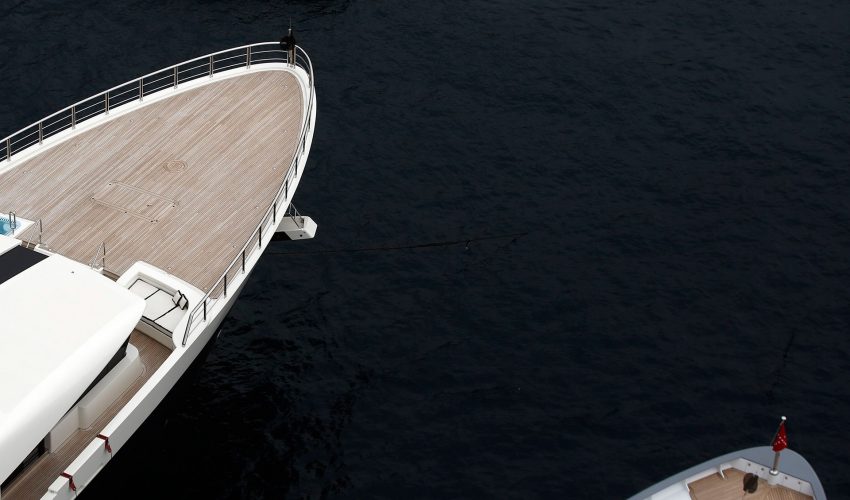- Individual passports of all crew members are inspected on entry into Greece aboard a yacht, as is the case on departure with the same yacht. If leaving or arriving by other means (e.g. by air or ferry), documents will be inspected by Immigration at the point of arrival/exit and any visa (if required) date stamped.
- All non-EU yachts must clear in with the port police, Customs, Health, Immigration and Currency Control on arrival. The ship’s papers – including detailed crew list – will be inspected by the port police and cruising tax levied as detailed below.
- EU-registered yachts need only report to the port police office at their first port of call with their documents and pay the cruising tax as detailed below. Proof of VAT payment may be required but in practice is rarely asked for.
- Yachts must carry their original registration documents and ship’s radio station licence – one member of the crew must be in possession of a certificate to operate the radio/VHF
- The original insurance certificate and a Greek translation showing Third Party insurance with the amounts in figures need to be produced. These minimum amounts are:
- 293,470 EURO liability for death or injury by sinking, collision or other cause for crew and third parties,
- 146,753 EURO for damage,
- 88,041 EURO for pollution.
- The skipper should have an International Certificate of Competence (although in practice this is rarely requested)
- For non-EU citizens, nights should be spent on board (not in hotels ashore, etc) – if not, the Harbour Master and the Immigration officer should be notified
- The registered yacht owner/skipper should be on board. If handing the boat’s command to someone else, ensure that the proper documentation is obtained from the Port Police
- Fishing is only allowed with a snorkel in certain areas. Fishing with scuba gear is prohibited
- To protect archaeological sites, scuba diving is restricted – permission should be sought locally
- Chartering by foreign yachts is now allowed, but the vessel must be inspected and certificated according to Greek law, a process that involves a huge amount of red tape
Fees and Charges
All Boats
- From 1 January 2014 allboats entering Greek waters are subject to a new cruising tax, irrespective of how long they stay. The tax is levied as follows: Overall length 7m – 8m: €200; 8m – 10m: €300; 10m – 12m: €400; Over 12m: €100/metre. There is a 30 per cent reduction for yachts permanently kept in Greece. For yachts over 12m, it is also possible to pay the tax on a monthly basis at a rate of €10 per metre. It appears that this new tax will replace all other current taxes, including the Transit Log, but until it is fully in force this is not absolutely certain. Athene of Lymington
Dekpa
- EU-registered yachts have for a number of years been required to obtain a Dekpaat their first port of call at a cost of 30 EURO, to be presented for stamping on arrival at and departure from each subsequent port of call. The Dekpa is valid until there is no more space for stamps, when a new one must be purchased. In practice, it is only required to be presented once a month for stamping. Currently it appears that the issuing and stamping of the Dekpa will continue after 2014 (when new regulations are due to be introduced to coincide with the introduction of the new cruising tax).
- Note:The Depka situation has changed from 14/4/2014. The Greek law is number 4256/2014 and the main points that affect private cruising boats are as follows: 1. it is only necessary for Greek flagged and EU flagged boats to obtain a DEKPA stamp once per calendar year (this will be when you pay the cruising tax – whenever they start collecting that). 2. Greek flagged and EU flagged boats only need to visit the port police on first entry to Greece and then only once per calendar year (Chapter D Article 10.1a). 3. Greek flagged and EU flagged boats do not need to report to the port police on entry or exit to/from any Greek ports (Chapter D Article 10.2). 4. The Depka requirement applies to yachts over 7.0 metres (previously, it applied only to yachts over 9.0 metres).
Transit Log
- As of 1st October 2015 Greece has re-adopted the EU-wide protocol for non-EU flagged yachts. Non-EU fagged yachts will be issued with a Transit Log on first entry to Greece that allows VAT-free movement anywhere in EU waters (including Greece of course) for up to 18 months. The EU rules also allow for an extension to 24 months, Greece has indicated that this extension will be available on application (HMRC in the UK reserves it for ‘exceptional circumstances’). The 18 month clock can be stopped by placing the boat in customs bond (which in Greece means on the hard and local customs advised). Neither the EU, nor Greece, specifies how long a boat must be out of EU waters before it can return for another 18 month Transit Log. It is likely in Greece that evidence of leaving the EU will be required (a marina receipt for example) but it should be possible, on expiry of the 18 month Transit Log, to pop over to Turkey for a night and then return to Greece and obtain another 18 month Transit Log. The TPP (cruising tax) will have to be paid by non-EU flagged yachts at the same rates as EU flagged yachts (when and if it is ever introduced).
- Note that these provisions only apply to non-EU flagged yachts that are owned by a non-EU resident. Non-EU flagged yachts owned by EU residents will be given a Transit Log valid for only 30 days, after which the yacht must either permanently leave EU waters or be imported into an EU country and VAT paid. This provision is to allow EU residents to purchase a yacht that is not VAT paid in the EU and export it.
Other charges
- All public harbours charge a mooring or anchoring fee based on the tonnage and length of the yacht that is usuallyaround €8 for an 11.0 metre yacht, payable to the port police. Boats from EU countries pay lower fees than those from non-EU countries, while Greek flagged boats pay even less. A debate is currently taking place in the Greek marine ministry as to whether the new cruising tax should replace these local payments entirely – Athene of Lymington.
- If a boat is stored ashore a ‘lift permission’ is required, and a ‘launch permission’ to launch it. These are obtainable from the Port Police and cost a few euros – and some tax. Good boatyards will obtain these for you.
- Note:Non-EU boats may now be charged by the port police a fee (I paid 672 Euros in 2014 for a 10 metre sailboat) that was originally applied to non-EU fishing boats. I was told that this is a one time fee, due when a non-EU boat enters Greece for the first time. The port police in Lavrion are charging this fee but I am not aware of any other port police who are doing so. —Daphnoula.




